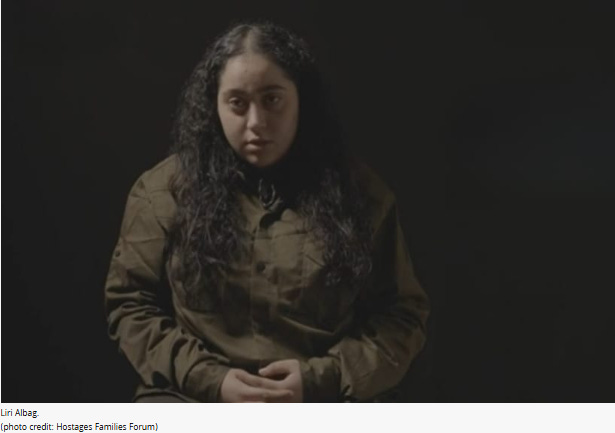Hamas Continues to Psychologically Torture Families of Hostages
Inside the Sinister World of Hamas' Psychological Warfare Tactics

Since the onset of its conflict with Israel, Hamas has demonstrated a chilling propensity for psychological warfare, leveraging fear, manipulation, and propaganda to achieve its objectives. The recent release of a hostage video featuring 19-year-old Liri Albag underscores the terror group’s ruthless strategy. Held in Gaza for over 450 days, Albag’s tearful plea for her life and her family’s agonized response is a calculated move by Hamas to exploit human emotion and destabilize its enemies. This video, like many others, is not just a cry for help but a weapon wielded to pressure Israel and manipulate global opinion.
Hamas' strategy exemplifies what the Jerusalem Center for Security and Foreign Affairs’ Dr. Irwin J. Mansdorf describes as "psychological asymmetry," where a weaker opponent manipulates perceptions to gain an upper hand through psychological means. This is not just a tactic of desperation but a deliberate, methodical approach to warfare that transcends the battlefield.
In the three-and-a-half-minute clip, Albag is visibly distressed, describing harrowing conditions and directly addressing Israeli officials, including Defense Secretary Israel Katz. By forcing hostages to publicly plead for their lives, Hamas aims to intensify public pressure on the Israeli government to negotiate ceasefires or make concessions. The anguish of Albag’s family, who released stills from the video to raise awareness, further amplifies the emotional toll on Israeli society.
This video is part of a larger, orchestrated campaign to fracture Israeli unity and undermine morale. Each release is meticulously timed and worded, with calculated messaging designed to sow division within Israel and present Hamas as a formidable, unrelenting force.
The Broader Context of Hamas’ Tactics
Hamas’ psychological warfare is multi-faceted, targeting not just Israeli society but also Palestinians and the international community. For Palestinians, Hamas portrays itself as the unyielding defender of their cause, even as its governance exacerbates suffering in Gaza. For the global audience, Hamas seeks to frame Israel as an oppressor through exaggerated narratives of civilian casualties and humanitarian crises. These tactics are part of a broader strategy to manipulate global opinion and pressure Israel on the international stage.
As highlighted in the paper Close but No Cigar: Hamas’ Psychological Warfare Against Israel Between 2014 and 2023, these efforts include the calculated use of staged scenes to evoke outrage. The goal is to gain an edge in the battle for public perception, even as Hamas itself orchestrates the suffering it decries. This approach often resonates with international audiences who may lack the context to critically evaluate such narratives, amplifying Hamas' message.
Dr. Ron Schleifer and Dr. Omer Dostri similarly analyze that Hamas’ psychological campaign began long before the October 7, 2023, attacks.
The group’s calculated release of videos featuring hostages, including Albag’s, represents the “fourth stage” of its psychological warfare strategy. Earlier stages included planning and documenting attacks, broadcasting acts of terror, and ceremonially releasing hostages to project an image of humanity. Each stage builds on the last, creating a continuous psychological assault that disrupts Israeli society and bolsters Hamas’ propaganda efforts.
The strategy of attempting to psychologically manipulate Israeli society can also be seen in a document found on former-Hamas leader Yahya Sinwar’s computer. Reported by the German tabloid Bild on September 6, the document, dating back to spring, outlines tactics personally approved by Sinwar. It explicitly calls for "continuing to exert psychological pressure on the families of the prisoners [referring to the Israeli hostages], both now and during the first phase [of a ceasefire deal], so that public pressure on the enemy government increases."
This document reaffirms Hamas’ manipulation of hostages and reveals its intent to delay ceasefire negotiations, despite devastating civilian losses in Gaza, to secure terms favorable for rebuilding its military capabilities. Sinwar’s strategy explicitly involves maintaining pressure on Israeli society while portraying Israel as intransigent on the global stage.
Impact on Israeli Society and Negotiations
The emotional toll of Hamas’ tactics on Israeli families and society is immense. Videos like the one featuring Liri Albag plunge families into despair, reigniting public outrage and calls for government action. The broader Israeli public, exposed to repeated images of their fellow citizens in captivity, faces heightened anxiety and frustration. The psychological impact extends into the political sphere, as leaders navigate public pressure and the moral dilemmas posed by such propaganda.
Hamas’ use of hostages also influences policy. The timing of the Albag video coincides with renewed negotiations in Doha, aiming to force Israel into concessions. Meanwhile, the pressure on Israeli leaders to prioritize hostage recovery complicates military operations and diverts attention from long-term strategic objectives.
As Israel continues to navigate this psychological assault, the challenge lies in not only countering Hamas’ aggression but also exposing and resisting its manipulative strategies. The stakes in this conflict go beyond territory or politics—they strike at the very resilience and humanity of those involved.


